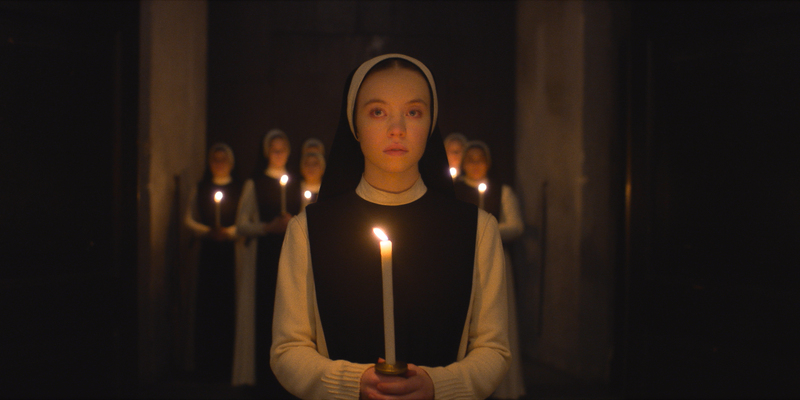
Review by
Eric Hillis
Directed by: Michael Mohan
Starring: Sydney Sweeney, Simona Tabasco, Alvaro Morte, Benedetta Porcaroli, Dora Romano

Following
Huesera: The Bone Woman,
Nightmare
and
Deliver Us, Immaculate is the latest in a recent wave of horror movies
that employ a pregnant protagonist to prompt an interrogation of female body
autonomy. Like Deliver Us, the mother-to-be in question is the recipient/victim of an immaculate
conception and believed to be carrying the reincarnation of Christ.
Drawing on the classic trope of a wide-eyed American being preyed upon by
sinister Europeans, young MidWest nun Sister Cecilia is invited to take her
vows and serve at a remote Italian convent dedicated to caring for
terminally ill nuns. Horror fans will know this is the sort of offer you
should never accept, as will everyone else when they witness another young
nun (Simona Tabasco) come a cropper by attempting to escape the
convent in a pre-credits sequence.

After settling into her new surrounds, Cecilia is shocked to find herself
interrogated about her sex life prior to joining the convent. She swears she
is still a virgin, but her superiors insist this can't be the case as she's
pregnant! The convent leaders eventually decide to believe Cecilia, claiming
that she has been chosen to bring the Messiah back into our earthly realm.
Of course, Cecilia is given no say in the matter, but as a devout follower
of Christ she's all too happy to play her part in the second coming.
But as Cecilia's belly grows she begins to grow dubious about the whole
affair. She's approached by mute elderly nuns who seem to be attempting to
warn her. She's attacked by a fellow nun who seems determined to stop the
pregnancy. And what's with the creepy figures clad in red masks?

Immaculate has been compared in some quarters to the Italian
and Spanish nunsploitation films of the 1970s, but aside from its convent
setting it shares few elements with its Latin predecessors. There's
certainly none of the explicit lesbianism that characterised most of those
movies, and the violence is nowhere near as gruesome and certainly never as
sexualised. What it does share is a mistrust of the Catholic Church. Some of
Immaculate's creepiest moments occur before the sinister plot has been revealed,
highlighting the inherent misogyny of the institution, such as when Cecilia
is required to kiss the ring of an elderly bishop in order to complete her
vows. The script was originally penned over a decade ago and yet for an
American audience its themes have become more resonant today given the
recent furore over female reproductive rights in that country.
What really distinguishes Immaculate from the typical
nunsploitation fare of the past is how seriously it takes its plot.
Andrew Lobel's script and Michael Mohan's direction take care
to ensure everything goes off smoothly when the truth is revealed, and to
its credit the script features the most ingenious explanation of an unlikely
scientific development since Jurassic Park. But this commitment to the twist means the film is hamstrung in how far
into the fantastic it can lean. The movie is so determined to keep us
guessing as to whether Cecilia is the victim or supernatural or earthly
forces that it never allows itself to become as crazily inventive in its set
pieces as the sort of '70s exploitation cinema it seeks to remind us of.
When the lounge-tastic theme tune of
The Red Queen Kills Seven Times
plays over a montage here it only serves to remind us how staid the film is
in comparison to the likes of Emilio Miraglia's giallo thriller. The latin
genre filmmakers of the '70s couldn't care less about their films' plots,
which usually didn't make sense anyway, and it's this very favouring of
dream logic over narrative sensibility that allows them to endure. We
persist in revisiting these films because they deliver the sort of thrills
you just don't get in modern films like Immaculate.

The difference between Immaculate and its '70s predecessors
is akin to the disparity between David Lynch's Dune and
Denis Villeneuve's recent adaptations. In that case I believe a talented craftsman like Villeneuve is more
appropriate for a rambling space opera than a slightly mad artist like
Lynch. But when it comes to a horror movie about buxom nuns being menaced in
a convent I'd rather it be helmed by some perverted lunatic than a steady
pair of hands like Mohan.
There are brief glimpses of the movie Immaculate could have
been if skippered by a Verhoeven or Ducournau, the highlight being a late
freakout that sees Sweeney channel Isabelle Adjani's infamous miscarriage in
Zulawski's Possession (a classic example of a film that
benefits from favouring dream logic over narrative cohesion). Sweeney is
very good at channelling her character's apprehension but I never quite
bought her as a Catholic zealot. She never manages to convincingly express
how Sister Cecilia might feel about becoming the most important woman in
Christian lore since the Virgin Mary. It's not entirely her fault, as the
movie has no interest in exploring this aspect.
Immaculate wants to critique the Catholic Church but it
doesn't seem to understand the appeal of Catholicism. The best anti-Catholic
films of the past were made by filmmakers who despised the church while also
harbouring a profound fascination with its rituals and iconography. Say what
you will about the Catholic Church, but they sure know how to create scary
images. The average stained glass window is more lurid and unsettling than
anything we see in Immaculate. With its focus on words and grounded storytelling over powerful images
and supernatural subplots, Immaculate is a decidedly
Protestant take on Catholic horror.

Immaculate is on Prime Video UK now.

